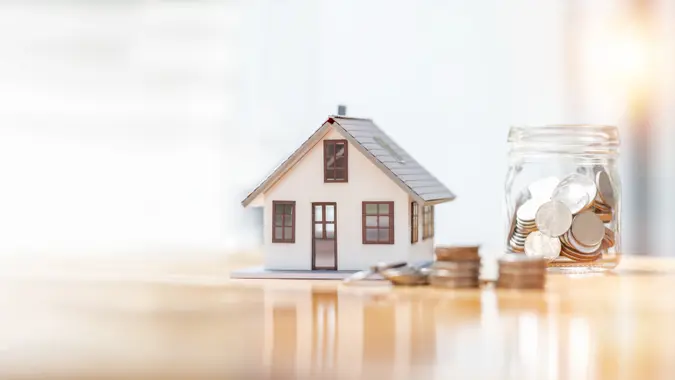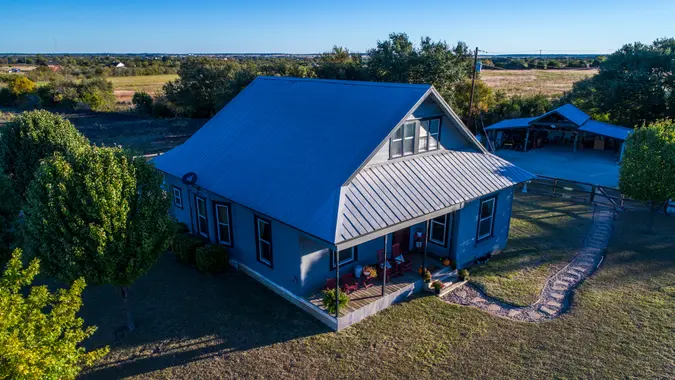5 Key Signs It’s Worth Losing Your Low Mortgage Rate To Buy a New House

Commitment to Our Readers
GOBankingRates' editorial team is committed to bringing you unbiased reviews and information. We use data-driven methodologies to evaluate financial products and services - our reviews and ratings are not influenced by advertisers. You can read more about our editorial guidelines and our products and services review methodology.

20 Years
Helping You Live Richer

Reviewed
by Experts

Trusted by
Millions of Readers
Call it “higher interest rate-aphobia.”
When mortgage rates hit all-time lows at the beginning of the decade, many American homeowners locked in historically sweet deals. With rates now significantly higher, many of those same homeowners are avoiding buying something new for fear of higher interest.
Rates aside, life moves on and pressures to buy something new may increase. With sub-3% rates on 30-year fixed mortgages long gone and unlikely to return anytime soon — rates were around 6.76% as of mid-March 2025 — how can you tell when it’s time to suck it up and take on a higher rate?
It’s a question worth asking according to Liz Hagg, a Ramsey preferred financial coach and the founder of LH Personal Financial Coaching.
“I hate for a rate to be the thing that’s holding someone back from doing something they love,” Hagg said, adding that current rates are still well below all-time highs. “When you have a low rate for so long, it seems normal. Even though it’s not normal.”
Here are five signs that it may be time to let go of that low rate and buy a new home.
You’re in Solid Financial Shape
Hagg’s top method for shedding worries about losing your low rates? Prioritize your financial health, get your financial house in order, and you’ll be less concerned with maintaining a dream mortgage rate. Nothing solves worries about higher rates quite like having your current house paid off. If that’s a ways off, you can start with some financial basics.
“Reluctance because of having a lower rate is a symptom of a bigger issue,” Hagg said. “And that is, how are you doing financially? Someone who is financially solid, who has an emergency fund … higher rates aren’t going to bother them.”
She said a strong, adaptable plan is important. “Life is coming at you. If you don’t have a plan to deal with all of the financial ‘Whack-A-Moles,’ you’ll be exhausted.”
If your financial situation is markedly better than when you secured your current mortgage, even better. A higher income, improved credit score or reduced debt-to-income ratio may qualify you for larger mortgage loans or better terms.
Your Current Home No Longer Fits Your Needs
Many are prompted to move when their home no longer suits their lifestyle.
Perhaps your family is growing, and your once-perfect three-bedroom house now feels cramped. Or maybe you’re an empty nester with extra rooms that sit unused and add unnecessary upkeep to your life. Changes in work habits, such as a shift to remote work, may also leave you longing for a dedicated home office or additional space to accommodate work-life balance.
If your current home is holding you back or causing stress due to its size or layout, it may be time to look for a house that better meets your needs — even if it means trading in a favorable mortgage.
Your Neighborhood No Longer Suits You
The neighborhood you fell in love with years ago may not align with your lifestyle anymore. Job relocations, changes in school districts or proximity to family and friends can make a significant difference in your quality of life.
Alternatively, if you’re drawn to neighborhoods with better amenities, more walkability, access to green spaces or a more vibrant social scene, a move may be in order.
Your Equity Has Risen and Market Conditions Are Favorable
A strong real estate market could provide a financial incentive to sell your current home and upgrade to a new one. If your home’s value has increased significantly since you purchased it, you might have built up substantial equity. This equity can act as a springboard for a larger down payment on your next property, potentially offsetting the impact of a higher mortgage rate.
Keep an eye on local real estate trends. A seller’s market — where demand exceeds supply — can present opportunities to maximize profits from selling your existing home, giving you more leverage when negotiating your next purchase.
Your Current Home Needs Expensive Repairs or Upgrades
Older homes often require ongoing maintenance and repairs that can be both time-consuming and expensive. If your current property needs significant upgrades — such as a new roof, HVAC system or kitchen remodel — it may make more sense to invest in a newer home rather than pour money into your existing one.
By purchasing a home with modern features and energy-efficient systems, you can save on utility costs and maintenance headaches while enjoying a fresh start.
Takeaway
Remember that a low mortgage rate, while great and all, isn’t the only factor to consider. Clinging to a low rate may prevent you from embracing opportunities that lead to greater personal fulfillment.
And don’t forget that interest rates may fluctuate in the future. Refinancing options could present themselves and improve your rate on a new home in the future.
“I see it as more of a contentment issue,” Hagg said. “I don’t see it as being about the rate. See what you can afford.”
 Written by
Written by  Edited by
Edited by 

























